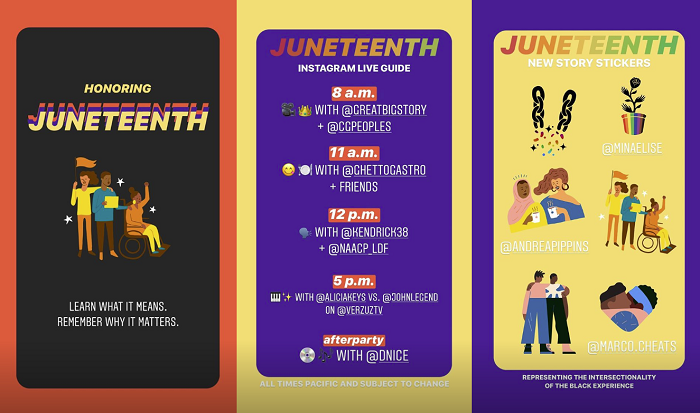SOCIAL
How Social Media Platforms are Marking Juneteenth, Which Commemorates the End of Slavery in the US

Today is Juneteenth, an event which commemorates the day that the last remaining enslaved people in the United States were freed back in 1865. And amid the #BlackLivesMatter movement, Juneteenth has taken on increased significance this time around, and to mark the occasion, the major social platforms are all seeking to amplify black voices and provide events and resources to showcase its cultural significance.
Here’s what each platform is doing for Juneteenth 2020.
First off, Facebook is running a series of events on its ‘Lift Black Voices‘ mini-site, which it launched this week as part of a range of new funding and resource commitments to assist the black community.
Juneteenth commemorates the day in 1865 when the last remaining enslaved people in Galveston, Texas finally learned of…
Posted by Facebook on Friday, June 19, 2020
Instagram, meanwhile, is also running a series of events for Juneteenth, and has added new stickers to help users participate in the event and show support.

Instagram has also launched a new set of guides which focus on providing information about Juneteenth, providing support for the black community, and addressing issues related to racial diversity and representation.
An internally, Instagram has also canceled all of its staff meetings in order to instead run a series of sessions with external experts about racial justice and racial inequality.
Over at Twitter, the company has made Juneteenth a paid holiday for staff, and has sought to raise awareness of the event in several ways.
First off, Twitter’s added a new Hashtag emoji that will be displayed on any Juneteenth related tag.
Juneteenth represents freedom, emancipation, and liberation.
To celebrate #Juneteenth is to know Black history. It’s to know American history. And it’s to understand the work doesn’t stop here.
Here are voices and resources to keep you going. And here’s why… ???? pic.twitter.com/NsNi6aFKmz
— Twitter Together (@TwitterTogether) June 19, 2020
Tap through on the above tweet and you’ll also be able to access a range of resources to provide more information on Juneteenth and its meaning to the black community.
Twitter’s also added another new hashtag emoji to the tag #BlackJoy.
Twitter’s also running a new campaign to amplify black voices via tweets on billboards, which are being displayed today in eight key cities that have been at the center of the #BlackLivesMatter movement.

And Twitter has also shared a message from #BlackLivesMatter founder Opal Tometi via its new voice clips tool.
LinkedIn, meanwhile, is sharing a range of news stories, resources and highlights via LinkedIn News, helping to connect users to relevant info.
And TikTok has added a dedicated Juneteenth page, which showcases a collection of resources to provide users with more information about the commemoration, and Black history more broadly.

The page also connects users with social justice organizations that they can support, while TikTok is also partnering with BLKFREEDOM.org, a digital commemoration of Juneteenth that’s been put together by six Black museums and historical institutions, in order to connect users to the initiative.
And amid the various efforts to promote Juneteenth, Snapchat has had a slip-up, promoting a commemorative Lens which showed chains breaking in response to the user smiling in the frame. Snapchat has apologized for the insensitive depiction and removed the Lens.
That error once again highlights the role that social platforms play in disseminating information, and the cultural sensitives they need to factor in to all such decisions. According to The Verge, the team which develops Snapchat’s Lenses is based in Ukraine, and is therefore not as familiar with the intricacies of American history. But that’s for Snap to manage, and the issue itself points to another concern highlighted today by The New York Times – that while social platforms are keen to highlight their support for such causes, their platforms can be, and are being, used to amplify racial division, which is a core concern they need to address.
Various forms of racial discrimination and hate have been amplified by social networks. Social apps themselves, as the platforms will argue, are not the cause of such in broader society, but the medium can be used to fan the flames of racism, and with so many people now engaging on social, the potential reach of such movements can be significantly boosted by these tools.
While events to mark Juneteenth, and to support racial diversity are important, it’s equally important that the current focus on such is not a temporary trend, and that the momentum of #BlackLivesMatter does lead to serious policy change, and action, on a deeper level, within all organizations.
